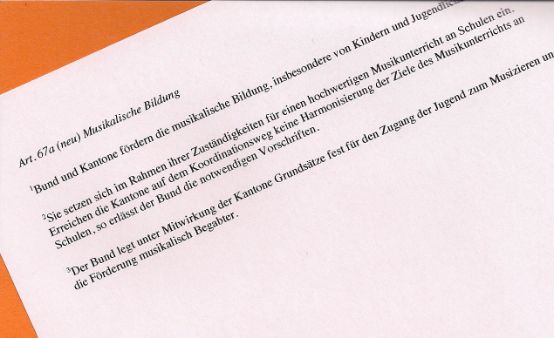72.8% from Oui! et maintenant?
At its meeting on December 6, the Parliamentary Music Group worked on the implementation of the constitutional article on music promotion, revealing strong differences of opinion between the EDK and music associations.

On September 23, the Swiss people overwhelmingly decided that the Confederation should promote music education. How are we now going to turn this wish into law? Article 3 of the new law stipulates that the Confederation is responsible for promoting extracurricular music. Alain Berset has set up a working group to draw up proposals. The Parliamentary Music Group (GPM), on the other hand, is mainly concerned with support for compulsory schooling (Article 2). Susanne Hardmeier, General Secretary of the Conference of Cantonal Ministers of Education (CDIP), was invited to the December 6 meeting to share the cantons' views on the subject.
Tense, emotional debate
The latter explained that work on harmonizing curricula was well underway, and would lead to the desired musical education. This statement was not at all convincing to the representatives of the associations, who were quick to point out the dramatic state of music teaching in several places. In their view, it is important to set up a working group covering the whole of Switzerland to tackle the problems of shortage of qualified personnel and recognition of diplomas, in particular. Harmonization alone will not suffice. Susanne Hardmeier felt that such a working group would be pointless.
Jean-Frédéric Jauslin, Director of the Federal Office of Culture, tempered the debate by pointing out that the vote had only taken place two months ago, and that the cantons needed more time to implement music promotion. Stefano Kunz, General Secretary of the Swiss Music Council, emphasized that the associations which had initiated the new article of law also had a say in its implementation.
At the end of a fairly heated and emotional debate, Christine Egerszegi, member of the Council of States and head of the parliamentary music group, decided to draw up a status report for the group's next meeting in June 2013. The EDK will have to set out the concrete measures it plans to take to adapt study plans to the new law. The umbrella association of teachers will organize a survey in the various cantons and compare the results with the EDK's point of view.
Changing mindset
When asked about this, Stefano Kunz explains that there are three problems with implementation. The first is that different working groups are each working on different articles of the future law. The second is the position of the EDK, which fails to appreciate the urgency of the situation. Thirdly, politicians have always regarded music as a leisure activity. Making it compulsory requires a change in their mindset.
Full text in German : www.musikzeitung.ch/de/politik








